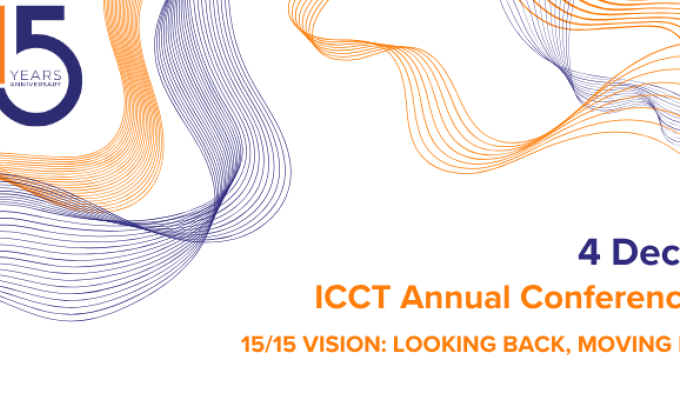Counter-Terrorism After 9/11 is a podcast series exploring how counter-terrorism has changed in the aftermath of the terrorist attacks on September 11th, 2001.
In our fourth episode, we speak to Tom Parker, author of "Avoiding the Terrorist Trap: Why Respecting Human Rights is the Key to Defeating Terrorism".
This interview explores the different historical manifestations of counter-terrorism, how these patterns shifted after 9/11, and why its future is firmly grounded in human rights. Interviewing him is Alexander von Rosenbach , who at the time of this recording was ICCT’s Interim Director.
You can listen to Counter-Terrorism After 9/11 using the audio player below or through your favourite podcast player (Spotify, Apple, Google, Breaker, Pocket Casts, RadioPublic). Below is a transcript of the interview, which has been shortened and adapted for publication.
Warning: This transcript/podcast contains material that some viewers may find distressing.
Disclaimer: This interview transcript includes minor differences to the interview audio that reflects corrections made in post-production.

Tom Parker
ALEXANDER VON ROSENBACH: Tom, welcome to the podcast. We’ve been looking forward to speaking with you so thank you very much for joining us today.
TOM PARKER: Absolutely, my pleasure.
VON ROSENBACH: I'd like to start by asking a little bit about your career. Can you walk us through that professional journey?
PARKER: I started out as a security service officer in the UK, working primarily in counter-terrorism, both Middle Eastern and Irish. I also spent some time working on counter-espionage targets and was seconded to the police, where I spent two years working on Italian organised crime. I spent four years working for the International Criminal Tribunal for the former Yugoslavia (ICTY), dividing my time between The Hague and the Balkans. I did work in the immediate aftermath of the Kosovo conflict.
But primarily, my focus was on crimes committed by Mujahideen volunteers, who fought in central Bosnia alongside the Bosniak forces. A lot of those fighters went on to become part of al-Qaeda, and its associated and affiliated groups. But just as it was arriving on the public radar, we were finding ourselves working on crimes committed by many people who've gone on to play quite important roles within the early, pre-9/11 era of al-Qaeda. I moved out of ICTY. I was asked by the UK Government to join the Coalition Provisional Authority to help create the tribunal, the Iraq high tribunal that ultimately put Saddam on trial. So I spent six months or so in Baghdad in 2003 to 2004 doing that. Came back from that, had a fellowship at Yale.
I found myself being asked increasingly to work with human rights organisations, who were trying to bring universal jurisdiction prosecutions against people who had committed grave war crimes or grave breaches of the Geneva Conventions or other types of atrocity, crimes against humanity or genocide. That led to running the Iran Human Rights Documentation Centre. And then a stint as the Policy Director for terrorism, counter-terrorism and human rights with Amnesty International USA. I went back to working for the UN again for the counter-terrorism implementation task force for about three years, then another three years working for the European Union back in Baghdad, with the Iraqi office and the National Security Adviser during the rise of ISIS.
More recently, I've been working for United Nations Office on Drugs and Crime in Nigeria, with a focus on Boko Haram and supporting efforts to defeat the insurgency in the northeast.
VON ROSENBACH: Super, thank you very much for sharing that. Before we talk a bit more in depth about your experiences and the lessons you've learned along the way, would you mind telling our listeners where you were on 9/11 and what you recall about that day?
PARKER: I was actually in Mostar, Bosnia, taking a statement from a torture victim. I vividly remember coming out at the end of the session, very focused on the witness. Somebody told me what had happened. Then things kind of went into overdrive because my wife and son were actually flying out of Boston that morning to New York. So the immediate panic was which flight had crashed into the towers. The next moment of panic is my brother-in-law is a New York City firefighter. And we were very early on hearing about the loss of two to three-hundred New York firefighters. My in-laws live in lower Manhattan, so then there was the concern about where they were. And the cell phones were down. It took me about five hours to finally get through to the United States. And I remember getting through to my sister-in-law, and first thing she said to me was, ‘everyone's okay’.
I got on one of the first flights back to the US. I remember seeing the smoking ruins from the plane as we came in to land at JFK, and then I remember, I had to go through multiple military checkpoints [to move down to the area where my in-laws lived]. So yeah, very, very close to home, very visceral.
VON ROSENBACH: Thanks for sharing that deeply personal experience. I'd like to follow you a little bit through the immediate aftermath and ask you how that lived experience impacted your career. Did you immediately feel you needed to engage with what had happened or did that come later through other developments in your career?
PARKER: That's a really interesting question. And quite a difficult one to answer. When I left the security service, one of the reasons I left was because it didn't seem to be an area where there was a growing future. I remember, it was not 9/11, it was the two embassy bombings in 1998, just the callousness, particularly in the bombing of the US Embassy in Nairobi, the disregard for local life, made that attack and therefore this group, al-Qaeda, different. And so there was something about the Nairobi bombing that made me think we were about to face a new challenge and that it was really serious.
That was the moment where I did think about going back. I did apply for a couple of jobs in the counter-terrorism realm in the aftermath of 9/11. But we rolled pretty quickly from that into Iraq. [I] was keen to go, and that was the opportunity that took me back into, into this realm as somebody working in this field or around this field.
VON ROSENBACH: Thanks Tom. What do you think we got right in response to 9/11? I'm sure for instance, you spent a lot of time at Amnesty International tackling what didn't work, but I am very curious to know if you see any successes.
PARKER: To be honest, it's much easier to talk about what went wrong rather than what went right. I don't think the United States had much alternative, but to respond in Afghanistan the way it did, initially. If the response had stopped at the routing of the Taliban out of the country, and their removal from government, and hadn't then evolved into a long term nation building exercise, then we might have been able to talk about a successful response. But it's very hard to even make that claim because [of] the unintended consequences that flow from a dramatic action, like ousting the government, it's very hard to predict what will happen. But other than that, it's really hard to look at successes in the initial response. I think almost every major decision that was taken in the aftermath of 9/11 was a bad one.
It was [my] experience of six months in Iraq, watching us alienate the Iraqi population, on an almost daily basis that changed the way I thought about things. I sat down to try and think, what historical lessons there were, that illuminated the experience that I had been through in Iraq, and whether or not there were some patterns of good responses and bad responses, that one could tease out of the historical record that could inform better policy responses. And that culminat[ed] in writing a book, 'Avoiding the Terrorist Trap'.
VON ROSENBACH: Can you tell our listeners a little bit why, in your view, we continue to repeat the mistakes of the past and why we seem unable to learn from that history?
PARKER: I think the answer to that is quite complicated but also at the same time quite simple. The first thing I would say is that my work owes as a major debt, literally a one line in Louise Richardson's book, 'What Terrorists Want', where she referred to a pathology of state overreaction. She mentions that states seem to respond so thoughtlessly to terrorist threats that you could argue that there's a pathology there.
That was kind of a start at a point of departure for me, because I thought, 'Wow, that's a very sweeping statement, that can't possibly be right'. I went back and 15 years reading and researching every terrorist campaign I could find out about, to see if I could disprove that concept. And the reality is, by and large, if there's a serious, consistent abiding challenge to governmental authority from a terrorist group, governments tend to overreact to that threat. What's more - terrorists know that. One thing that became clear to me through my research, is that there's basically a terrorist doctrine. Terrorists learn from each other, they set out to learn as much as they can from previous terrorist organisations experience.
If you look at every terrorist campaign, they revolve around six core themes. Asymmetrical warfare, you know, the idea that it's going to be a long, attritional conflict. The idea that propaganda by deed, that the targets you choose, and the types of attacks that you mount, you communicate your message, and your intent. The use of revolutionary prototypes; of charismatic leadership. But the key two themes that you'll see come up again and again in every terrorist organisation is the idea that they are contesting legitimacy with the state, and that they want to provoke an overreaction. There's a great description by a writer David Fromkin that terrorism is basically political jujitsu, terrorists know that they are nowhere near as powerful as the state, that they can't match the military power of the state. What they set out to do is to harness the state's military power and use it against it. And they will use that state overreaction to polarise society. As the state clamps down on a minority group and identifiably other group, terrorist groups will exploit that experience of that community to recruit more people By overreacting, and by introducing draconian measures, states alienate their allies. And that makes it harder for them to gather intelligence and it also limits their scope and reach. This idea of provoking the state, is hardwired into terrorist group after terrorist group The worse the reaction, the better for us.
There's nothing new about this, but states seem unable to process that. There's a reason, which is that terrorism is essentially something that afflicts democratic states and democratic politicians have to take their publics into account. Publics are frightened by terrorism, and they want to see tough responses. And tough responses are not always smart responses. But you get stuck in this sort of world of security theatre, where you have to be seen to be doing something. At the end of the day, the public doesn't always let the politicians do the smart things. And that is the terrorist trap.
VON ROSENBACH: With that in mind, would you mind sharing with us what you consider to be perhaps the most damaging state overreactions in countering terrorism over the last 20 years?
PARKER: Let me respond by focusing specifically on the US response to the 9/11 attacks, because many of the steps that the United States took after 9/11 are the kinds of steps that lots of democratic governments have taken when facing significant terrorist threats for the first time. I think one has to bear in mind that the United States was also in a somewhat unique situation. It hadn't had a great experience of domestic terrorism itself And then you suddenly find yourself faced with the largest terrorist attack in history with 9/11. So it's not surprising to me that the United States overreacted. That is, to a certain extent, understandable. It shows the importance of these international norms of international human rights law, because these international standards are there to stop you overreacting. To give you red lines that you don't cross, because when you cross those lines, you play into the terrorists hands.
If we look at the sort of most egregious missteps that the United States made, I think there are three of them. The first would be the decision to try people suspected of being members of al-Qaeda and the Taliban before the military commissions in Guantanamo Bay. It has proved very, very unsuccessful. And we’ve been treated to the spectacle of people being held in cages, in orange jumpsuits. We've seen the word Guantanamo become a byword for abuse. Another huge one [misstep] was the use of torture. And I don't have any hesitation in describing enhanced interrogation techniques as being on that spectrum And then the third big misstep for me is targeted killing. The use of drones outside of recognised combat areas. While I think there's legitimacy to use them in places like Afghanistan and Iraq, where you have troops in combat, that becomes a lot more problematic when you're using them in countries where you don't have troops on the ground. We know that drones have killed many innocent people And we know that the former leader of the Pakistani Taliban Baitullah Mehsud used to tell his supporters that every drone strike brings me three more suicide bombers. So you are not even diminishing the pool of people that you're fighting. I'm not convinced that any of these three tools have had any utility whatsoever. I am convinced that their use has been very damaging to the cause of defeating terrorism.
VON ROSENBACH: Thank you very much, Tom. It's quite an indictment, but I think an important one to put out there. I wanted to get your view about how we answer this question of effectiveness. There is sometimes this idea that taking the tough line is the most effective way to counter terrorism, and that if you are constrained by human rights, or the rule of law, you're a bit soft. Have you been confronted with that idea in your work and if so, how do you answer it?
PARKER: This is a really interesting point, because it's not a conversation that takes place very often. And that is because human rights advocates don't talk about efficacy. And they don't want to talk about efficacy, because for them it's an issue of law and morality. And if you make it about efficacy, the argument goes, you undermine law and morality, right? Because you are in a world of the ends justifying the means. And I understand that point of view. But I wrote my book precisely because nobody was talking about the efficacy argument. I'm not making an ends justifying the means argument. I'm simply conducting an historical analysis. And I'm not concluding in any way shape or form that one should only follow human rights because they're effective. I am making the argument that human rights do provide a framework within which the most effective counter-terrorism is carried out.
But as a general rule, human rights advocates, they don't want to engage on efficacy arguments, because they're worried it will undermine the international standards that have been established. And I respect that position, and I understand it. But I have, also as a human rights advocate myself, found that a very unpersuasive argument when I've been in the field conducting trainings.
I found simple arguments like, this is what the International Covenant on Civil and Political Rights says, this is what the Convention against Torture says, these aren't very persuasive arguments to most guys on the front line. The fundamental point that I'm making is that ultimately, if you're in law enforcement, if you're in the military, if you're in the security world, you are following the laws of your land. The international perspective doesn't land that heavily with you. So then you have to find a way that the principles that you're advocating for land in a way that they register them. And there are a couple of different ways to do that. One is in terms of tactical and strategic utility. Another is by pointing out your actual personal liability As I always say to the classes I teach, we still prosecute Nazis.
But then the other side of it is also making a slightly different argument, which is you don't need to do these things to be effective. Within international human rights law, [you have] all the latitude you need to conduct effective investigations. Human rights law is pretty permissive. The only real requirements placed on states and the way that they use intelligence resources, are that they are lawful. And that isn't that high a bar.
So there's no tension, I would argue, between international human rights law and effective counter-terrorism. I think most professionals, when they actually take a step back and think about it, realise this. Because we know one of the things that drives, one of the main drivers of terrorism recruitment, is experience of human rights abuses, or physical abuse or force by the state. And we know this is one of the main reasons why people join terrorist organisations.
VON ROSENBACH: I think it's extremely important and yet somehow overlooked in so much of our counter-terrorism response over the years. I guess this brings me to the last question of the day, which is to help us address the emergence of right wing extremism. What lessons from your professional experience from the last 20 years of jihadi focused counter-terrorism, do you think we should heed as we start thinking about what to do about the right-wing extremist threat?
PARKER: I think that's a great question. I think the first thing to say is, I don't think the old threat is over. I think ISIS, its related affiliates around the world like Boko Haram in Nigeria, but also the whole range of different Islamist violent extremist groups around the world, still pose a very, very serious threat. And I don't think that threat is going to disappear anytime soon. I'm not a great believer in wave theory. That there's one type of terrorism and then suddenly another type of terrorism comes along. It is possible to have two things going on simultaneously. And I think that is what's happening.
I think we are seeing an increase in right wing extremist terrorism. But this is nothing new, I think that's one important point to make. There have been violent right wing, exclusionist, ethnically motivated terrorist groups around consistently for 150 years. The Ku Klux Klan the Black Hundreds, right wing extremist organisations fighting anarchists and socialists in Russia. We've seen fascist groups supported by Hitler and Mussolini in the 1920s and 30s. Right wing groups have been around [for] as long as any of the other types of terrorist groups. There's a little ebb and flow to them. These currents have been around in our society for a very long time. And every now and again, they get a little bit more momentum.
I think in terms of our response, we just need to have faith in our laws. We have the powers we need to investigate the right wing extremist groups, they are no different from an investigators point of view, from a target point of view, as a left wing group, or a religious extremist group. They will be motivated by many of the same things, they will have many of the same vulnerabilities. You do the same things that you have been doing in other investigations in other places, within the law.
One thing that I think we do have in our favour is we've been doing this a lot for the last twenty years. So there's a lot of skilled people out there at the moment. And I don't think this is a particularly hard target to penetrate. But I do think it has the potential to pose a potentially existential threat. And the reason I think that is because you have had a president of the United States that has provided succour to these groups. And that’s just extraordinary, to have an internal threat that is given that kind of political cover by one of the main political parties in the country. And that's really unusual. So this is a very serious and alarming situation. But I don't think it requires new techniques or new methods. And in fact, I think it's incredibly important that we don't go outside the bounds of the law. I think this is one of those cases where legitimacy is going to be an incredibly important part of winning this conflict.
There's a great image that I always like to use, because I think it's really important and it comes from Mao. You often hear terrorism being described as the war of the flea. This is Mao's famous description of guerrilla warfare and of terrorism, the war of the flea. But people don't actually understand Mao's metaphor, because he’s not talking about the fleas, the damage is not done by the flea bites. The fleas bite the dog, but it's the dog scratching at the bites and those bites becoming infected that weaken the dog and ultimately degrade the dog to the point, where it's no longer able to defend itself. You know, it's what the dog does to itself that weakens it rather than what's done to it by external actors, and I think that's an important image to bear in mind as we think about how to respond to bites from right wing extremist groups.
Terrorism is cyclical, most terrorist organisations tend to burn themselves out within twenty or thirty years. But there are very few terrorist organisations that are multi-generational. This is one of those instances, where we will see this current trend burn itself out relatively quickly. But only if we stay calm, maintain our cool and respond in a way that is measured, resolute, but also lawful. And I don't think you can really do anything else. You just have to be patient. You have to stay within the law. And you have to have faith that your system of government and your way of life is sufficiently attractive, that the vast majority of the people living in your country want it to stay the way it is.
VON ROSENBACH: Thank you again very much for your time today. It's always a pleasure to chat with you and to hear your insights on this topic. To all our listeners, if you like what you heard today, please go pick up a copy of Tom's book. It's called ‘Avoiding the Terrorist Trap: Why Respect for Human Rights is the Key to Defeating Terrorism’.
PARKER: Alex, it was entirely my pleasure.
If you enjoyed this interview with Tom Parker, then World Scientific Press is offering a special promotional discount on new purchases of Avoiding the Terrorist Trap. Go to https://www.worldscientific.com/worldscibooks/10.1142/p995 for 55% off the hardback edition (use code P995PARKERHC) and 30% off the eBook (use code P995PARKEREB).
Photocredit: ICCT/Canva








